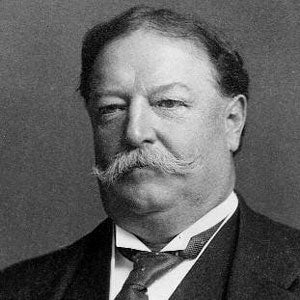
The hand-picked successor of Theodore Roosevelt, Taft is remembered as much for his weight – he was the heaviest-ever president – as for his achievements in office.
A former judge who preferred the law to politics, he was admired for his administrative competence both by William McKinley – who made him chief civil administrator in the Philippines – and by Theodore Roosevelt, who made him Secretary for War. But he did not flourish when he emerged from Roosevelt's shadow.
Said by some to have accepted the Republican nomination only on the insistence of his ambitious wife, Taft described the election campaign as "one of the most uncomfortable four months of my life". He won easily, largely on the basis of Roosevelt's popularity, but soon alienated Progressives with his perceived conservatism. In fact, he proved quietly effective, continuing Roosevelt's anti-trust work (he initiated 80 anti-trust suits), creating a Children's Bureau, conserving public lands, establishing a postal savings system, and initiating a constitutional amendment to permit an income tax. But his defence of the Payne-Aldrich Act, which continued high tariff rates, alienated many liberal Republicans as well as Democrats; the latter's opposition to the tariff helped them to regain control of the House in 1910 elections. Taft further antagonised Progressives – and Roosevelt himself – with his relatively timid approach to conservation.
In 1912, New Mexico and Arizona were admitted to the Union, and so Taft became the first man to be the President of the 48 contiguous states. He was also the first of them to practise what later became known as "dollar diplomacy" – using diplomatic influence and the veiled threat of military power to promote US business interests abroad.
His re-nomination for the Republicans for 1912 prompted Roosevelt's defection to lead a new Progressive party. Many of his supporters followed him, thus handing Woodrow Wilson an easy victory. Taft polled just 23 per cent of the popular vote – the lowest of any incumbent in US history.
Released from the burdens of the presidency, Taft took up a position serving as professor of law at Yale University, until President Harding made him Chief Justice of the United States in 1921. Taft considered this his highest achievement: "I don't remember that I ever was President," he wrote towards the end of his life. He died in his sleep in 1930.
In his own words
"What's the use of being president if you can't have a train with a diner on it?"
"Politics makes me sick."
In others' words
"He is not only absolutely fearless, absolutely disinterested and upright, but he has the widest acquaintance with the nation's needs without and within and the broadest sympathies with all our citizens." Theodore Roosevelt (1908)
"Dumber than a guinea pig." Theodore Roosevelt (1912)
Minutiae
Taft was the heaviest American president ever. His weight sometimes approached 24 stone, and he got stuck in the White House bath-tub several times. Eventually, he had a larger one installed.
He was the first president to have a presidential car.
With his large moustache, he was the last US president to wear facial hair.
He had a habit of dropping off to sleep in meetings.
He lost 80lb within a year of leaving the White House and by 1929 was 92lb lighter than his peak weight of 23st 10lb.
He began the tradition of a presidential "first pitch" of the baseball season. The event took place on 4 April 1910, during an opening day game between the Washington Senators and the Philadelphia Athletics. Every president since – except Jimmy Carter – has performed this ritual at the opening of at least one season.
Subscribe to Independent Premium to bookmark this article
Want to bookmark your favourite articles and stories to read or reference later? Start your Independent Premium subscription today.

Join our commenting forum
Join thought-provoking conversations, follow other Independent readers and see their replies